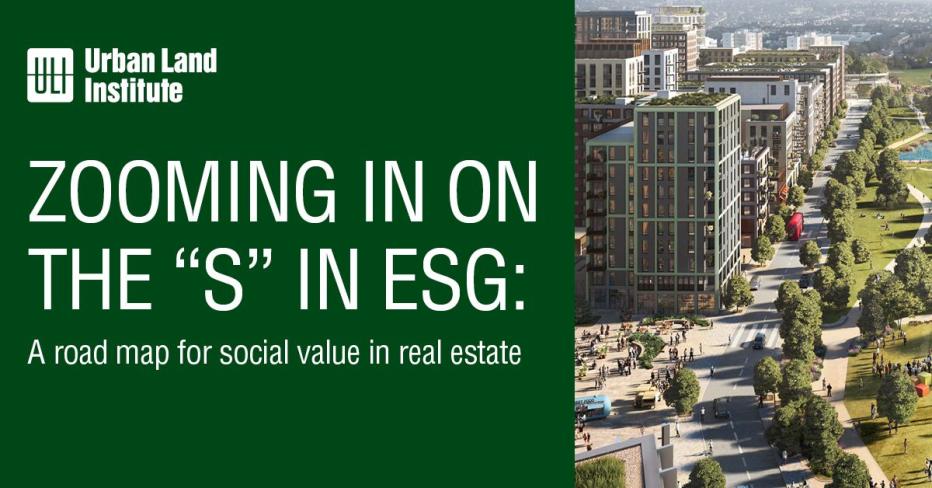
The Urban Land Institute (ULI) has launched a new report, Zooming in on the “S” in ESG: A road map for social value in real estate, to guide the industry on incorporating social value into corporate strategy, business practices and even investment theory. ULI is a global, member-driven organization comprising more than 45,000 real estate and urban development professionals dedicated to shaping the future of the built environment for transformative impact in communities worldwide.
ULI highlights that business leaders and investors across all industries increasingly acknowledge their role in tackling environmental and social problems and meeting the challenge of sustainable development. However, so far, most attention has been focused on environmental issues and the risks and opportunities associated with mitigating climate change rather than focusing on social factors.
The report confirms, through global surveys, a growing interest in the social dimensions of sustainable development and the key concept of social value. Alongside this interest has come the rise of impact investing – investing with the intention of contributing to tackling social or environmental challenges or both while generating a financial return. In the meantime, there is no shared understanding of what it is in the real estate industry, nor a common approach to describing and measuring social value, with an increasing number of frameworks, tools, and methods designed to support social value or impact measurement and reporting, that can be difficult to navigate.
The report identifies six key barriers based on a survey of and interviews with senior real estate professionals and other stakeholders:
- Political, economic and business culture
- Fragmentation and lack of alignment in decision-making across different stakeholders
- Focus on financial return expectations
- Lack of consensus and transparency
- Focus on outputs, not outcomes
- Lack of knowledge and skills
The report asks the real estate industry to acknowledge its social responsibility and its role in leaving a lasting legacy, stating that, for this to be achieved across the industry, the creation of social value must span the value chain and the life cycle of assets. Good intentions must not be lost in the transfer of projects between organizations, teams or stages, and metrics might need to be switched to maintain continuity as projects move from planning to construction and then to management.
To support the industry on its journey, the report provides the foundation for a road map by describing the actions needed to underpin a strong, enduring and trusted future for the real estate industry. The road map highlights six categories of action:
- Government led place-based vision and strategy
- Corporate leadership
- Transparency, accountability and data
- Innovation
- Education and training
- Collaboration
As social value creation for real estate is by definition place-based, the starting point is for government to provide a vision and establish sustainable development objectives and priorities. Local, place-based expectations and needs are best articulated at the local government level and co-created with citizens, community groups and businesses.
“Leadership within my organization” was identified as the most significant driver of social value creation by survey respondents. Prioritizing social value creation requires a cultural shift within the industry. While impact investing has an important role to play in driving such change, ultimately, it is about mainstreaming social value creation such that social and environmental factors become an integral part of all development and investment decisions. Leaders in social value creation act in the belief that any costs in enhancing social benefits will help reduce risk and lead to more attractive, long-term risk adjusted returns and sustainable value creation.
“This new report from the ULI highlights that while the desire to create and measure social value through real estate investments is increasing, the understanding of the optimum way to do so in practice is still emerging," said Jacobs Director of Economics Margarethe Theseira. "Jacobs recognised the global pivot that is underway in moving investment decisions away from solely creating maximum financial return to a more holistic measurement framework that also includes wellbeing, environment and societal impacts. We are pleased to be working in partnership with Simetrica-Jacobs to provide our clients a bespoke approach to delivering social value through the design, build and operational phases of their investments.”
ULI Europe CEO Lisette van Doorn commented: “As providers and stewards of the built environment, the real estate industry has a clear role to play in creating social value. We need to prioritize and consider the role of the real estate industry in helping tackle social and spatial inequalities. The key to enhancing social value creation is redefining value not just in financial terms, but also to account for social, economic and environmental well-being outcomes over the long-term.”
ULI’s report highlights that innovation, education, collaboration and knowledge sharing are all critical for driving change. Areas to focus on include the design of new business and financial models that embed long-term social value creation, the development of new investment products, the use of technology for spatial analysis and data collections, and innovation in governance and policy areas. Professional bodies will have an important role to play in knowledge sharing and influencing the development of education and training programs.
The report was sponsored by ULI members participating in a steering group, including Jacobs, CBRE Global Investors, Credit Suisse, Estabona Management, Fore Partnership, Ivanhoé Cambridge and PLP Architecture.
The full report is available at europe.uli.org/social-value.












































